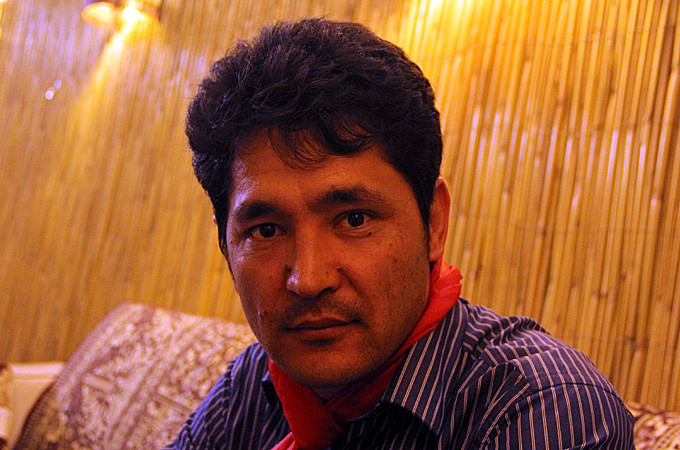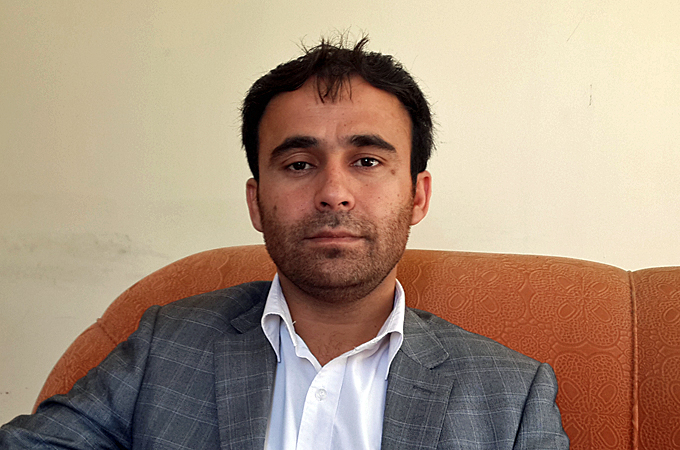Afghanistan’s stability torn between two men
After allegations of widespread fraud, Afghan runoff poll has split emerging fragile democracy between two contenders.

Kabul, Afghanistan – On June 23, Zia-ul-haq Amarkhil, a high ranking electoral official, stepped down from his position when a leaked audio tape alleging he plotted with presidential candidate Ashraf Ghani’s campaign to conduct election fraud.
In a press conference simultaneously held with the Independent Election Commission (IEC), Ghani’s opponent Abdullah Abdullah said Amarkhil’s resignation does not solve the issue if “industrial-scale” fraud is not addressed.
In addition, Abdullah released another audio tape in which a governor allegedly talks with an Army officer about stuffing ballot boxes in favour of Ashraf Ghani.
“There is not only a question of fraud and irregularities as a technical shortcoming, but also more important is the question of the political aspect of the issue, the question of withdrawn political trust in the process and entities,” Asif Ashna, a young political activist, told Al Jazeera.
In countries where democracy is practiced nascent, such protests are always witnessed. However, if the IEC announces us as the winner of the runoff, we will form an inclusive government. We will not allow anyone to cause violence and threaten the stability
However, Naeem Abubzada, the head of the Transparent Election Foundation of Afghanistan (TEFA) believes that the dispute is more related to technical shortcomings.
“There is no doubt that election by its very nature is a political process, but we should not undermine the significance of its technicality.”
Possible instability
The Afghan election results are further threatened now that Abdullah Abdullah has suspended relations with the election commission and has withdrawn his observers from the counting process.
Ashna said he believes that if the crisis is not managed shrewdly, instability is both imminent and inevitable.
“If Abdullah announces a cabinet, then the crisis would be uncontrollable.”
Hamid Farooqi, an Ashraf Ghani spokesperson, said he believed that there was always distrust on the losing side in emerging democracies.
“In countries where democracy is just beginning, such protests are always seen. However, if the IEC announces us as the winner of the runoff, we will form an inclusive government. We will not allow anyone to cause violence and threaten the stability.”
The UN special representative for Afghanistan told the Security Council that if the situation isn’t resolved quickly, the standoff between the two candidates will only get more intense.
While many have expressed concerns over continued instability if the election process does not end peacefully, Ayubzada believes it still won’t tear the country apart.
“There might be some protests, even physical and violent reactions to the results if one side finds it unjust, but I am sure it won’t overshadow the prospect of future in the country.”
 |
| Political activist, Asif Ashna believes that any UN involvement will worsen the crisis in Afghanistan [Moh. Sayed Madadi / Al Jazeera] |
Solutions
With the inauguration of the next administration set for August 2, there is no clear way out of the current deadlock.
Even though Abdullah was the clear frontrunner in the first round, Ashraf Ghani reportedly won the runoff. This leaves both sides rejecting any solution that doesn’t leave them the winner.
Abdullah Abdullah has accused the election commission, the complaints commission and President Hamid Karzai of fraudulent activities that favoured Ashraf Ghani. And he has asked for United Nations involvement.
But the UN, the United States and other international organisations have resisted getting involved while urging both sides to follow the law and to allow the IEC to finish the election count.
RELATED: The Afghan ballot test
UN role?
Ashna, the political activist, said he thinks that any UN involvement will worsen the crisis.
 |
| For Naeem Abubzada the current political crisis is more of a technical issue [Al Jazeera / Moh. Sayed Madadi] |
“The UN will not have any effect. There should be a commission leading the secretariat of IEC comprised of representatives from both sides. Both candidates should send in their envoys with absolute authority and political trust.”
Meanwhile, Ghani’s camp reportedly welcomes the UN role.
Ghani’s spokesperson, said: “The international community has played a crucial role in recent decades and the UN in particular has been a key player in the previous elections.
“However, I believe every issue related to election is predicted and explained in the constitution and electoral laws.”
“Thus the best way of the current deadlock to be broken is to trust the law and electoral bodies. Amarkhil has bravely resigned and the IEC has taken measures to ensure transparency, including recounting the votes of five provinces. We should allow them to do their job.” he said.
The coming weeks will determine if Afghanistan can peacefully transfer power from one elected administration to the other. And instability seems certain if the electoral bodies and candidates fail to act cautiously.